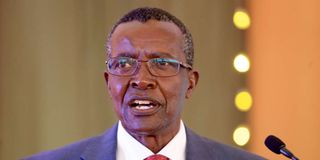Breaking News: Former Lugari MP Cyrus Jirongo dies in a road crash
Premium
Maraga advises Uhuru to dissolve Parliament over two-thirds gender rule

Chief Justice David Maraga.
What you need to know:
- Parliament was to enact the law within five years after the promulgation of the Constitution in 2010.
- This has not happened 10 years later.
Chief Justice David Maraga has advised President Uhuru Kenyatta to dissolve Parliament, in line with Article 261(7) of the Constitution, for its failure to enact legislation on the two-thirds gender rule.
In his advice to the President, the CJ said that the mechanism for the dissolution of Parliament, irrespective of the consequences, is the radical remedy that Kenyans desired in order to incentivise the political elites to adhere to and fully operationalise the transformational agenda of the Constitution.
"Let us endure pain if only to remind the electorate to hold their parliamentary representatives accountable," Mr Maraga said.
The CJ had received petitions seeking the dissolution of Parliament from the Law Society of Kenya, former Marakwet West MP David Sudi, Ms Margaret Toili, Mr Fredrick Mbugua, Mr Bernhard Aoko and Mr Stephen Owoko. They all argued that Parliament has deliberately refused to enact the two-thirds gender law.
Earlier, lawyer Nzamba Kitonga had said that in the event of the recommendation that the CJ has now submitted to the President, there is a likelihood that it will be challenged in court.
“From a constitutional standpoint, once the Chief Justice transmits his recommendation, the President is bound to act, and the Constitution allows him to act in one way only. That is something that has serious constitutional, legal and political consequences and the President would need to consult far and wide, including with the political leadership. But as to whether this president can follow through on the CJ’s recommendation is another matter,” lawyer Nzamba Kitonga told the Nation recently.
According to CJ Maraga, Article 261 (1), read together with the Fifth Schedule, provides that the enactment of the two-thirds gender principle was among the things Parliament was to do within five years after the promulgation of the Constitution in 2010. This has not happened 10 years later.
“There is no doubt the dissolution of Parliament will cause inconvenience and even economic hardship. The fact that Kenya is in the midst of the coronavirus pandemic only exacerbates the potential impact of the decision. Yet that is the clear result Kenyans desired for Parliament’s failure to enact legislation they deemed necessary. We must never forget that more often than not, there is no gain without pain,” Mr Maraga said Monday while recommending the dissolution of Parliament by President Kenyatta.





